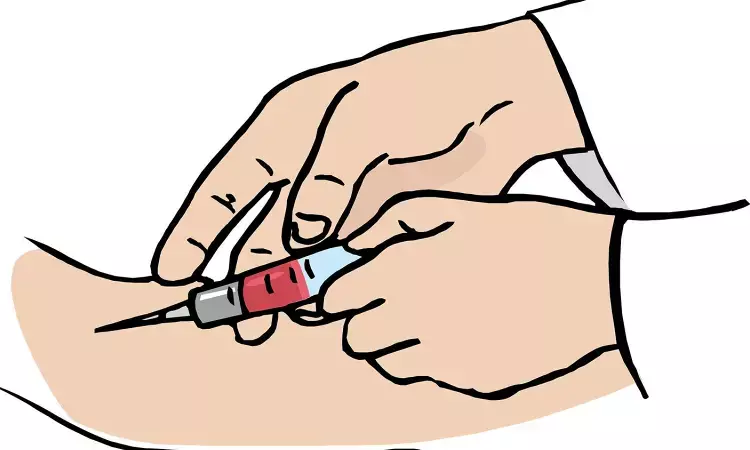- Home
- Medical news & Guidelines
- Anesthesiology
- Cardiology and CTVS
- Critical Care
- Dentistry
- Dermatology
- Diabetes and Endocrinology
- ENT
- Gastroenterology
- Medicine
- Nephrology
- Neurology
- Obstretics-Gynaecology
- Oncology
- Ophthalmology
- Orthopaedics
- Pediatrics-Neonatology
- Psychiatry
- Pulmonology
- Radiology
- Surgery
- Urology
- Laboratory Medicine
- Diet
- Nursing
- Paramedical
- Physiotherapy
- Health news
- Fact Check
- Bone Health Fact Check
- Brain Health Fact Check
- Cancer Related Fact Check
- Child Care Fact Check
- Dental and oral health fact check
- Diabetes and metabolic health fact check
- Diet and Nutrition Fact Check
- Eye and ENT Care Fact Check
- Fitness fact check
- Gut health fact check
- Heart health fact check
- Kidney health fact check
- Medical education fact check
- Men's health fact check
- Respiratory fact check
- Skin and hair care fact check
- Vaccine and Immunization fact check
- Women's health fact check
- AYUSH
- State News
- Andaman and Nicobar Islands
- Andhra Pradesh
- Arunachal Pradesh
- Assam
- Bihar
- Chandigarh
- Chattisgarh
- Dadra and Nagar Haveli
- Daman and Diu
- Delhi
- Goa
- Gujarat
- Haryana
- Himachal Pradesh
- Jammu & Kashmir
- Jharkhand
- Karnataka
- Kerala
- Ladakh
- Lakshadweep
- Madhya Pradesh
- Maharashtra
- Manipur
- Meghalaya
- Mizoram
- Nagaland
- Odisha
- Puducherry
- Punjab
- Rajasthan
- Sikkim
- Tamil Nadu
- Telangana
- Tripura
- Uttar Pradesh
- Uttrakhand
- West Bengal
- Medical Education
- Industry
Metformin effective against nondiabetic patients of Fanconi anemia: Study

USA: In a new study published in Blood Advances, it was shown that metformin is safe and tolerated in nondiabetic people with Fanconi anemia (FA) and may be helpful.
Fanconi anemia is a hereditary condition that affects DNA repair and is associated with bone marrow failure and cancer predisposition. Metformin, a biguanide metabolic drug, increases blood counts and slows tumor development. In FA mice models. As a result, Jessica Pollard and colleagues undertook a single-institutional pilot trial of metformin in non-diabetic patients with FA to investigate the feasibility and tolerability of metformin treatment and to see if metformin may enhance blood counts.
In this trial, fourteen of fifteen patients with at least one cytopenia (hemoglobin 10g/dL, platelet count 100K cells/L, or absolute neutrophil count 1K cells/L) were suitable for metformin treatment for six months. The median patient age was 9.4 years (range 6.0-26.5), with 8/14 males (57% ).
The key findings of this study were as follows:
1. Thirteen of fourteen individuals (93%) tolerated maximum age-appropriate doses; one subject had dose reduced due to grade 2 gastrointestinal problems.
2. There were no cases of hypoglycemia or metabolic acidosis.
3. There were no dosage interruptions owing to toxicity, and there were no grade 3 or higher adverse events associated with metformin.
4. Four of the thirteen evaluable patients had a hematologic response (HR) based on modified MDS IWG criteria.
5. The average time to respond was 84.5 days (range 71-128). Neutrophils (n=3), platelets (n=1), and red blood cells (n=1) all showed responses.
6. During therapy, no patients satisfied the criteria for illness progression or relapse.
7. Correlative research looked at the various mechanisms of metformin activity in FA.
8. Metformin reduced inflammatory pathways in plasma proteomics.
In conclusion, Metformin may be a safe and acceptable treatment option in non-diabetic patients with FA, according to this study. Additional research is required to strengthen the current evidence.
Reference:
Pollard, J., Furutani, E., Liu, S., Esrick, E. B., Cohen, L. E., Bledsoe, J. R., Liu, C.-W., Lu, K., Ramírez, M. J., Surrallés, J., Malsch, M. M., Kuniholm, A., Galvin, A., Armant, M., Kim, A. S., Ballotti, K., Moreau, L. A., Zhou, Y., Babushok, D. V., … Shimamura, A. (2022). Metformin for Treatment of Cytopenias in Children and Young Adults with Fanconi Anemia. In Blood Advances. American Society of Hematology. https://doi.org/10.1182/bloodadvances.2021006490
Medical Dialogues consists of a team of passionate medical/scientific writers, led by doctors and healthcare researchers. Our team efforts to bring you updated and timely news about the important happenings of the medical and healthcare sector. Our editorial team can be reached at editorial@medicaldialogues.in.
Dr Kamal Kant Kohli-MBBS, DTCD- a chest specialist with more than 30 years of practice and a flair for writing clinical articles, Dr Kamal Kant Kohli joined Medical Dialogues as a Chief Editor of Medical News. Besides writing articles, as an editor, he proofreads and verifies all the medical content published on Medical Dialogues including those coming from journals, studies,medical conferences,guidelines etc. Email: drkohli@medicaldialogues.in. Contact no. 011-43720751


